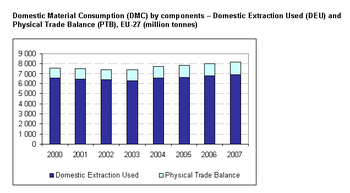Archive:Careers of doctorate holders
- Data from Month Year, most recent data: Further Eurostat information, Main tables and Database.
Doctorate holders and other research qualification holders are crucial to the creation, commercialisation and dissemination of knowledge and innovation. They are not only the most qualified, but also those who are specifically trained to conduct research. However, up to now, not much is known about their career and mobility patterns on the labour market. The statistics on Careers of Doctorate Holders (CDH) measure demographic, employment and career characteristics of these persons, as well as their international mobility and driving forces behind this mobility. These characteristics are measured both at national and international level. The international ‘Survey on Careers of Doctorate Holders’ is a joint project carried out by the Organisation for Economic Development and Co-operation (OECD), the UNESCO Institute for Statistics (UIS) and Eurostat.
Main statistical findings
The data described in this article is from the pilot CDH data collection 2006. The data is not yet available on Eurostat's free dissemination website and is still being validated, but is presented here to view what information can be
Text with Footnote [1]
Personal characteristics of research qualification holders
The number of men holding research qualifications tends to be higher than the number of women. In most countries the percentage of men exceeds 60% of the research qualification holders. Italy is the country with the highest share of women in this group, and is actually the only country where more women than men hold research qualifications. Generally, analysis has shown that there is a higher share of women holding research qualifications in the younger age classes. This is confirmed in the most recent updates of the data. The age distribution varies a lot between countries. For several countries, the ’35 44’ age group is the largest; for others, the age groups ’35 44’ and ’45 54’ are equally dominant. Overall, the older population (over 55 years old) accounts for only a small percentage in most of the countries.
Employment characteristics and work perception of research qualification holders
Most identified doctorate holders were employed at the time of the survey. The share of unemployed and inactive doctorate holders is lower than 2% in most countries. Exceptions to the unemployment rate are reported by Italy (2.7%), Germany (2.5%) and Austria (2.3%). Significant percentages of inactive doctorates are noted in Austria (4.7%) and the Netherlands (4.3%). A large share of the doctorate and research qualification holders is employed as teaching professionals. This is intuitive, as it is a quite common career to become either a researcher with teaching responsibilities or a lecturer in higher education (universities, etc.). In addition, many research qualification holders are employed in the field of physical, mathematical and engineering science. Generally, only a smaller part has become policy makers, senior officials and managers. It is also interesting to see the distribution of doctorate holders in researchers and non-researchers. More than half of the doctorate holders are employed as researchers in all countries, except for the Netherlands. In several countries the percentage of doctorate holders employed as researchers is as high as 70% or more. With regard to the sector of employment, the largest share of researchers works in the higher education sector. In almost all countries the respective percentage exceeds 60% and in particular in Lithuania it reaches 73.5%. The government sector appears to be the second choice for researchers followed by the business enterprise sector. In the private non-profit sector the percentage of employed researchers is on average below 10% for all countries, with the exception of Estonia (23.9%). The data indicate that research qualification holders are liable to stay with their employer for a longer time period; the majority of research qualification holders stay with their employer for 10 years or more, followed by those who are with the same employer for at least 5 years. The only exception is Denmark where a considerable share of employed research qualification holders has been with their current employer for one to two years. In almost all countries, research qualification holders mainly report to be ‘somewhat satisfied’ with their salary. This group is followed by those who are ‘somewhat dissatisfied’. The share of research qualification holders who states to be ‘very dissatisfied’ with their salary is rather low in the majority of countries, with the exception of Bulgaria (19.4%). However, by combining the two categories of dissatisfaction (‘somewhat dissatisfied’ and ‘very dissatisfied’), the salary appears to be one of the main reasons for which most research qualification holders are not satisfied with their work along with the benefits and the opportunities for advancement.
Inward international mobility of research qualification holders
The share of research qualification holders, citizens of the reporting country, who have lived or stayed abroad in the past ten years varies from 4.7% to 30.5% among the European countries. The main reasons for moving again into their country of residence are family or personal reasons, the completion of their doctorate and other job related or economic factors.
Data sources and availability
<description of data sources, survey and data availability (completeness, recency) and limitations>
Context
<context of data collection and statistical results: policy background, uses of data, …>
Further Eurostat information
Publications
Main tables
- Title(s) of second level folder (if any)
- Title(s) of third level folder (if any)
Database
- Title(s) of second level folder (if any)
- Title(s) of third level folder (if any)
Dedicated section
Other information
<Regulations and other legal texts, communications from the Commission, administrative notes, Policy documents, …>
For other documents such as Commission Proposals or Reports, see EUR-Lex search by natural number
External links
See also
[[Category:<Category name(s)>]]
Notes
- ↑ Text of the footnote.
